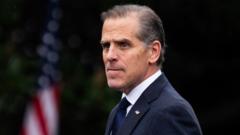Director of National Intelligence Tulsi Gabbard has revoked the security clearances of 37 current and former US officials, alleging political manipulation of intelligence and breaches of conduct. The decision, which was directed by President Trump, has sparked a heated debate about the motivations behind the action, with critics labeling it a political distraction.
Tulsi Gabbard Strips Security Clearances from 37 US Intelligence Officials

Tulsi Gabbard Strips Security Clearances from 37 US Intelligence Officials
In a controversial move, Tulsi Gabbard revokes security clearances for multiple intelligence officials, citing abuse of trust and politicization of intelligence.
In a significant and controversial action, Director of National Intelligence Tulsi Gabbard has announced the revocation of security clearances for 37 intelligence officials, both current and former. The sweeping move, executed under instructions from President Donald Trump, has drawn attention not only for its scope but also for the serious allegations it entails—that the officials in question have politicized intelligence for personal or partisan gain.
The memo, shared on Gabbard's social media channels, implicated numerous individuals who had served in senior national security roles during previous administrations, particularly under former Presidents Joe Biden and Barack Obama. Though she made claims of misconduct, Gabbard did not provide specific supporting evidence for these allegations, leading to questions about the veracity of the claims.
These security clearances are crucial as they allow individuals access to sensitive government information, necessary both for ongoing roles in government and in certain private sector positions, particularly in the defense and aerospace fields that require similar clearance by employment preconditions. It remains unclear how many of those named still held current clearances.
In the memo, Gabbard stated that the revocations were a result of the officials’ betrayals of public trust, describing their actions as an abuse of authority involving the leaking of classified intelligence and serious breaches of intelligence standards. "Being entrusted with a security clearance is a privilege, not a right," she emphasized on X, condemning those who she believes have placed their interests above those of the nation.
This decision is not entirely unprecedented, as the Trump administration has previously revoked the clearances of other figures critical of Trump’s presidency, including Biden and Vice President Kamala Harris. The administration has faced criticism for what many are interpreting as a politically charged move.
In the weeks leading up to this decision, Gabbard has been an outspoken critic against officials who concluded that Russian interference influenced the 2016 presidential election, a narrative that Trump and Gabbard have labeled as part of a "treasonous conspiracy" aimed at undermining Trump’s electoral success.
The recent actions have sparked resentment among Democrats, who consider the clearances revocations as an effort to distract from pressing issues facing the administration and anger over Trump's alleged associations with convicted sex offender Jeffrey Epstein.
As the fallout from this directive unfolds, the narrative surrounding the trustworthiness of intelligence officials and the politicization of intelligence work continues to be a point of major contention in the current political climate.





















